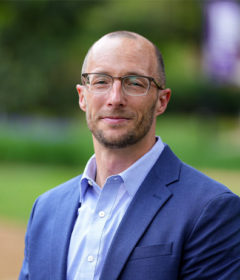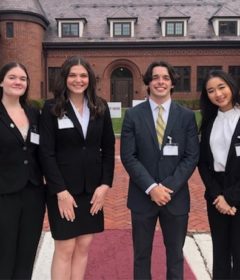Hatter Esports launches as club sport: Watch out Omnics!
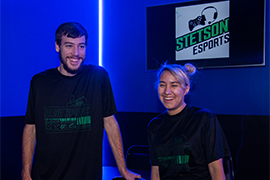
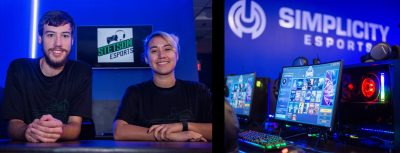
Stetson sports fans can soon be cheering for Doomfist and Junkrat when they take down another evil Omnic robot, or when Mages and Assassins of the planet Runeterra journey through the Summoner’s Rift to destroy the enemy’s Nexus.
The university’s sports scene is shifting due to Hatter Esports, an official club sport that was founded in April in order to field teams that compete in such wildly popular online video games as Overwatch (home of the Omnics) and League of Legends (set in the mythical Runeterra).
With Matthew Musser, Stetson’s Academic Success Coordinator for Tutoring and Stetson Peer Instruction, as Hatter Esports’ advisor, members are busy this semester working to further establish the club.
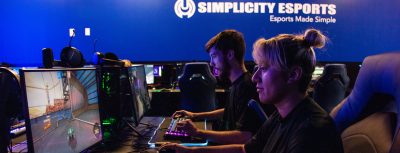
Hatter Esports social media manager Deanna Sanchez says the club hopes to begin competing in video game tournaments by next semester. Such tournaments may be against established teams with no university affiliation, or against groups of “randoms” playing online from locations anywhere from Albuquerque to Dubai.
The eventual goal “down the road,” says Hatter Esports president Tabor Filipello, is to compete against other schools organized in some sort of conference, just as Stetson’s baseball, basketball and other sports teams compete in the Atlantic Sun Conference. Florida State University, the University of Central Florida and Florida Gulf Coast University currently field Esports teams, Sanchez noted.
Meanwhile, Esports has expanded to the professional level. Fueled by corporate sponsorships and television exposure as ESPN, CBS and other networks air top-tier tournaments, professional gamers are earning big money.
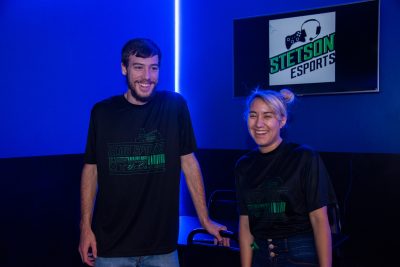
Hatter Esports will hold an open house at 6 p.m. Tuesday, Oct. 15, in Rinker Auditorium (Room 108) of the Lynn Business Center, 345 N. Woodland Blvd., DeLand. Filipello, Sanchez and other members will present information on the club and answer questions. The event is open to the Stetson community and prospective student members are encouraged to attend.
“Right now in the official competitive scene, Overwatch and League of Legends are the top two games,” says Sanchez, a junior political science major who grew up in Pennsylvania before her family moved to St. Cloud. Hatter Esports is fielding teams in each of those games because they “already have a big competitive scene and that way we can get ourselves into competitions and get a lot of members and start working from there.” Riot Games, the publisher of League of Legends, estimates the game has more than 100 million active players each month.

Simplicity Esports, which opened in August at 1697 N. Woodland Blvd., Suite 109D, near the Walmart Supercenter, in north DeLand.
Sanchez is a member of Hatter Esports’ League of Legends team. Filipello, a junior marine biology major from Ocoee, is on the Overwatch team.
For anyone who thinks the “sports” part of Esports is a misnomer because no running or jumping is involved, Filipello notes, “It’s actually not as easy to become good at a game as some people may think. It takes a lot of time and effort. Esports games are team-based and require a lot of mechanical knowledge of the game, and there’s a lot of strategy. You have to think about ‘If I do this, what can I expect my opponents to do and how do I counter it?’ ”
Hatter Esports currently is looking for a “home field” and is negotiating to rent space at Simplicity Esports Gaming Center DeLand, a facility that opened in August at 1697 N. Woodland Blvd., Suite 109D.
Founded in 2017, Simplicity Esports and Gaming Company is the first publicly traded, exclusively Esports organization in the U.S., says Roman Franklin, president of the company and a graduate of Stetson’s MBA program in 2011. Simplicity Esports now has 46 locations in 13 states. Filipello and Sanchez both work at Simplicity Esports’ DeLand center.
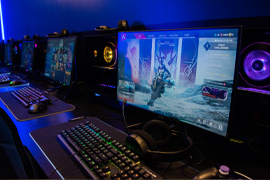
“Our goal with the Esports centers is to create an environment where gamers of all skill levels and all experience levels can gather and explore gaming in a community environment,” Franklin says. “We have everything from organized competitive tournaments on a local level to organized competitive tournaments nationally.
“From a casual perspective, gamers can rent time on our high-performance, high-speed gaming machines. Most of them are personal computers, but we also have high-end Xboxes with gaming monitors, with faster response times from a competitive standpoint. We try to cater to the full range of gaming interests.”
Gone are the days when the stereotypical image of a video game player was a lonely teen pressing buttons on his gaming device in his darkened bedroom.
“I call it the mainstreaming of the gaming movement, or legitimization for lack of a better term,” Franklin says. “Recently there was a Fortnite global tournament, the Fortnite World Cup in New York, where a 16-year-old won first place and took home $3 million.
“I have a 7-year-old and over the last couple of years I have gone from ‘Hey, get off of the PlayStation, get off the video games and study’ to ‘You have 30 more minutes to see how you can do.’ It’s like the way you would practice baseball or football or basketball.”
Universities are even offering Esports scholarships, and “it’s a legitimate career path now,” Franklin adds. “As a result of corporate money and corporate sponsors being thrown at this industry, it definitely has moved from the dank, dark basement to something that is mainstream and collaborative and more community-based now, as opposed to reclusive.”
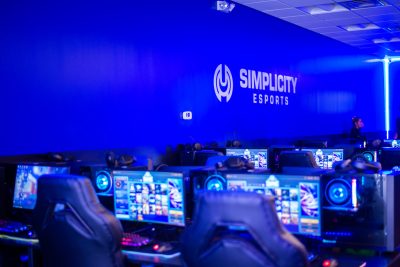
Likewise, both Filipello and Sanchez talk of building community through Esports, which is a big part of why finding a “home field,” whether at Simplicity Esports or on campus, is important to the club.
“Gamers are able to practice online with each other, but we really like it more to do so in person,” Filipello says. “When you get to high-end tournaments it’s all in person, and not only that, we want the teams to be bonding together. Meeting online, you’re just talking through your headset, but when you’re in person you can fist bump and celebrate with your teammates right there.”
“That’s the biggest part for us,” Sanchez says. “Obviously competing and winning are great, but we want to create a good community in our Esports teams.”
“If we are a good community within ourselves, then this campus and the school — the students and the faculty — will get behind that,” Filipello says. “We really are trying to build a positive community.”
-Stetson students currently receive 20 percent off everything at the DeLand gaming center on Hatter night every Thursday night, according to its Manager Paul McVay.
— Rick de Yampert

